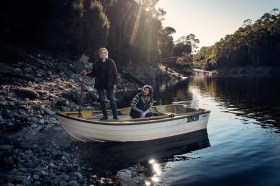For two years now, Victoria University’s Sir Zelman Cowen Centre has offered some highly successful executive producing courses in both Sydney and Melbourne, outputting a bevy of graduates who have done great things within film and television. So who should attend this course, and why? We asked course director Pamela Wilson-Endrina.
“Obviously our graduates are getting a lot out of it,” Pamela says. “It provides a great deal of highly relevant information about finance models, legal issues and distribution paths, in both film and television. Plus the course is an opportunity for students to gain a new perspective on the projects they’ve been working on.”
So what sorts of people tend to enrol?
“Our students are often emerging producers who want to sharpen their ideas about the business end of filmmaking,” says Pamela. “They are sometimes producers working within the industry who want to develop a specific project that might be different from anything they’ve done before. Or, sometimes our students come from related fields, like production accounting, as a move towards executive producing.”
When are the classes held?
“We hold our courses in July in Melbourne and November in Sydney,” she says. They take place over a couple of weekends, taking up six days in all. “One of the great things we’ve found with past courses is that when we put students together into creative teams, those teams often blossom into fully-fledged professional relationships after graduation,” Pamela adds.
Over the two years that Victoria University has run these courses, a number of participants have found synergies with fellow classmates to such an extent that they’ve gone on to form production companies.
“Students work in teams creating pitches for projects which they put to panels of established industry professionals,” Pamela advises. “The panel members are all highly experienced and currently working in the industry, and that often leads to mentoring or consulting roles further down the track.”
As an example, last year producer-director Nadia Tass offered a mentorship at Cascade Films that was so successful, the participating student stayed on and is still working with the company.
Pamela emphasises that the course is all about screen business, not about production. “It’s about raising finance for a project, such as by pitching to investors, drawing up business plans and coming up with viable financing models.” It also covers distribution, both in Australia and overseas, and across both TV and film, looking at the different models in use.
So the course is for television as well as film?
“Yes, the course targets both film and television, and in fact several of our past students have come in focussing on a film project and then decided to move to television, or the other way around.”
Is there a legal focus to the course as well?
“We are a law school,” said Pamela Wilson-Endrina, “as part of the Sir Zelman Cowan Centre at Victoria University, so of course we emphasise the legal framework of executive producing. But we explain the key legal concepts that you need to know about as practically and simply as possible.”
“We invite some very highly regarded experts to lecture in the course ,” adds Wilson Endrina. “For example, in the legal area we bring in experts such as Jenny Lalor, Peter Frankel and Shaun Miller, who have extensive experience in the field of copyright, intellectual property and rights acquisition.”
In fact all course teachers are both well-known and experienced. “People of the calibre of Alan Finney, Tait Brady, Mario Andreacchio and David Parker are extremely generous in contributing their vast industry knowledge and contacts in television and film, and about producing and distribution also,” she says.
This year VU will also hold master classes on key subjects of raising finance and establishing an international coproduction. And they also intend to host regular refresher days where graduates can return to pitch their projects to their peers and industry experts.
So how have past students benefitted from the course?
According to Pamela, several have gone on to change careers altogether. “One student moved from real estate to work in broadcast television as a result of the course. Another brought in a film project she was dabbling in, and decided to relocate to Sydney to work in the television industry.”
“Two students who met in the course decided to set up their own production company,” added Wilson-Endrina. Originally working as script editors, they became script consultants, and then began a fully fledged production outfit.
“One recent graduate is now working on a $20 million feature film,” added Pamela.
What does this course offer that isn’t available elsewhere?
A feature of the course is its international focus. There is an emphasis on working in foreign markets and co-partnering with foreign production companies. Following on from this, the course devotes significant coverage to relations with China – a fast emerging market for Western producers and one that the Australian industry is vigorously pursuing. “Last year the Sir Zelman Cowan Centre partnered with SPAA and the Australia China Screen Alliance to sponsor an emerging producer to participate in the SPAA Conference,” Pamela explained. He later met up with some Australian producers and I understand they are working on a project together.”We want to create opportunities for Australian and Chinese producers to get together and encourage partnerships in both Countries,” she said.
The trend is set to continue in 2012, when Pamela will be attending the Australia China Screen Producers Forum in Beijing this April in order to leverage relationships with Chinese producers and organisations such as the Beijing Film Academy and the Chinese Film Producers Association. And in the future, Pamela will be steering the course towards innovative funding streams, especially in the international arena. She cites the Institute for International Film Financing as a source of invaluable insights gleaned on a recent trip to Los Angeles. “The IIFF are a fabulous source of information on new ways of bringing finance to the table, and I make sure their latest insights are passed on to students.”
In 2012 the Sir Zelman Cowen Centre is offering the following courses:
Master Classes
Melbourne
Understanding International Co-productions – Finance and Legals (2 days)
June 16-17, 2012
Financing Your Screen Project – Sources and Strategies (2 days)
October 6-7, 2012
Sydney
Financing Your Screen Project – Sources and Strategies (2 days)
September 8- 9, 2012
Professional Certificate in Executive Screen Production
Melbourne
July 7-8, 21-22, and 28-29, 2012 (6 days)
Sydney
November 9-11 and 23-25, 2012 (6 days)
For more information, or to register for courses, phone 03 9919 1843 or email esp@vu.edu.au




